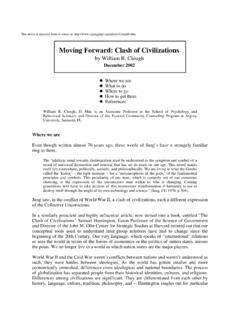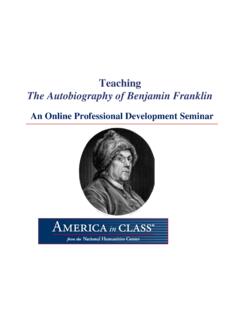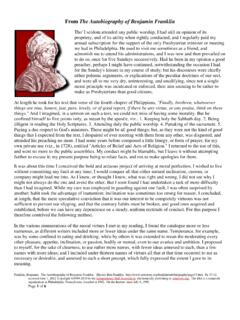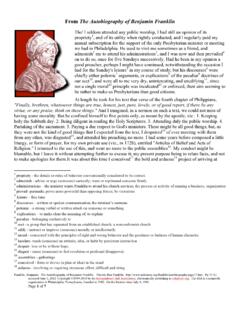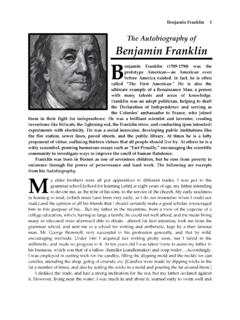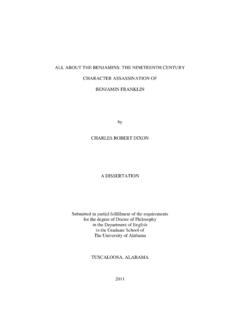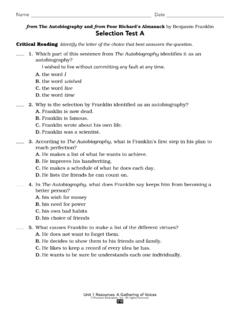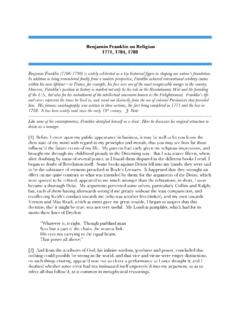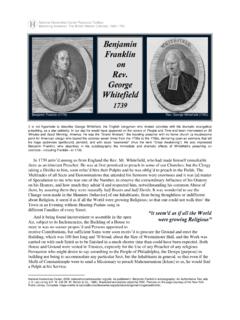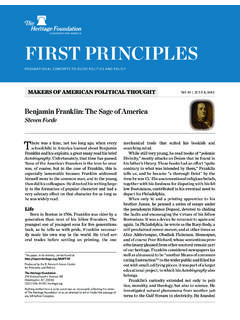Transcription of Complete Book: 'FORGOTTEN FOUNDERS, Benjamin …
1 The following is a Complete on-line PDF reproduction, and is reprinted here with permission of the author. We are verygrateful to Bruce Johansen for his generosity of spirit in allowing us to replicate this book . Hardcopy is available as a tradepaperback for $ from Harvard Common Press, 535 Albany Street, Boston, MA 02118. URL to the hypertext formattedversion of this book is at the bottom of the last page. F O R G O T T E N F O U N D E R S By Bruce E. Johansen Benjamin franklin , the Iroquois and the Rationale for the American Revolution 1 9 8 2 G a m b i t I N C O R P O R A T E D, Publishers O F I P S W I C H M A S S A C H U S E T T S First Printing Copyright 1982 by Bruce E. Johansen All rights reserved including the right to reproduce this book or parts thereof in any form. Library of Congress Cataloging in Publication Data Johansen, Bruce E.
2 (Bruce Elliott), 1950- forgotten founders Bibliography Includes Index 1. Iroquois Indians -- Tribal government 2. Indians of North America --Tribal government 3. franklin , Benjamin , 1706-1790. 4. United States --Politics and government -- Colonial period, ca. 1600-1775. 5. United States --Politics and government -- Revolution, 1775-1783. I. Title. 197 81-23726 ISBN 0-87645-111-3 AACR2 Printed in the United States of America. For my parents, and for John Crazy Bear, a Seneca who breathed life into the Iroquois Great Law of Peace for me C O N T E N T S ACKNOWLEDGMENTS INTRODUCTION CHAPTER ONE A Composite Culture CHAPTER TWO The Pre-Columbian Republic CHAPTER THREE "Our Indians Have Outdone the Romans" CHAPTER FOUR Such an Union CHAPTER FIVE Philosopher as Savage CHAPTER SIX Self-Evident Truths AFTERWORD BIBLIOGRAPHY INDEX Inside book Jacket FROM THE BACK COVER: THE GREAT LAW OF PEACE Article 24* The chiefs of the League of Five Nationsshall be mentors of the people for all time.
3 Thethickness of their skin shall be seven spans,which is to say that they shall be proof againstanger, offensive action, and criticism. Theirhearts shall be full of peace and good will, andtheir minds filled with a yearning for the welfareof the people of the League. With endlesspatience, they shall carry out their duty. Theirfirmness shall be tempered with a tenderness fortheir people. Neither anger nor fury shall findlodging in their minds and all their words andactions shall be marked by calm deliberation. * As translated in Akwesasne Notes, 1977 A C K N O W L E D G M E N T S Like most books, this one would never have been written without the encouragement,criticism, skepticism, and selfless devotion of many people. First among those people are theIndians who challenged me to find in the white man s archives documentary proof tobuttress Indian oral history.
4 Thanks go to John Crazy Bear, a Seneca whose ancestors helpedmake an American of Benjamin franklin , and to Phil Lucas, who provided early help withresearch leads, as well as Vine Deloria, Jr., whose encouragement (not to mention his manybooks) helped inspire me. Thanks go also to Sheldon Harsel, Alex Edelstein, Vernon Carstensen, and RusselBarsh, as well as William E. Ames, all of the University of Washington, who providedinvaluable criticism, and who were willing to listen to ideas for which other academics mighthave threatened to bust me down to a and hustle me off to the nut house. Roberto , a Chicano Pueblo, director of Seattle s El Centro de la Raza and compadreco-author of many years, also helped provide focus to the many drafts of this book . AlvinJosephy, Jr., also deserves many thanks for his criticisms and opinions of an early draft, asdoes Bruce Brown.
5 Invaluable aid also was given by many librarians and archivists, some of whom workat the University of Washington Libraries, the New York City Public Library, the AmericanPhilosophical Society, the Library of Congress (General Collection and ManuscriptDivision), the Department of Interior s Library, the Newberry Library, in Chicago, and theSmithsonian Institution s National Anthropological Archives. Many thanks go also to my aunt and uncle, who put up this savage from the mountainsof western America in a style to which he ought never to become accustomed inWashington, , and to Judy Ruben, who ensured that I would stay alive on meager meanson Manhattan Island, not an easy task these days. To all of you, and to Lovell Thompson and Mark Saxton of Gambit: you wouldn t beseeing this book if it weren t for your part in making it possible.
6 -- I N T R O D U C T I O N It is now time for a destructive order to be reversed, and it is well to inform otherraces that the aboriginal cultures of North America were not devoid of , in denying the Indian his ancestral rights and heritages the whiterace is but robbing itself. America can be revived, rejuvenated, by recognizing aNative School of thought. -- Chief Luther Standing Bear Lakota (Sioux) Land of the Spotted Eagle The seeds for this book were sown in my mind during a late-summer day in 1975, by ayoung American Indian whose name I ve long since forgotten . As a reporter for the SeattleTimes, I had been researching a series of articles on Washington State Indian tribes. Theresearch took me to Evergreen State College in Olympia, where a young woman, anundergraduate in the American Indian studies program, told me in passing that the Iroquoishad played a key role in the evolution of American democracy.
7 The idea at first struck me as disingenuous. I considered myself decently educated inAmerican history, and to the best of my knowledge, government for and by the people hadbeen invented by white men in powdered wigs. I asked the young woman where she hadcome by her information. "My grandmother told me," she said. That was hardly the kind of source one could usefor a newspaper story. I asked whether she knew of any other sources. "You re theinvestigative reporter," she said. "You find them." Back at the city desk, treed cats and petty crime were much more newsworthy thantwo-centuries-past revels in the woods the width of a continent away. For a time I forgot themeeting at Evergreen, but never completely. The woman s challenge stayed with me throughanother year at the Times, the writing of a book on American Indians, and most of a at the University of Washington.
8 I collected tantalizing shreds -- a piece of aquotation from Benjamin franklin here, an allegation there. Individually, these meant , however, they began to assume the outline of a plausible argument that theIroquois had indeed played a key role in the ideological birth of the United States, especiallythrough franklin s advocacy of federal union. Late in 1978, the time came to venture the topic for my dissertation in historyand communications. I proposed an investigation of the role that Iroquois political and socialthought had played in the thinking of franklin and Thomas Jefferson. Members of mysupervisory committee were not enthusiastic. Doubtless out of concern for my academicsafety, I was advised to test my water wings a little closer to the dock of establishedknowledge. The professors, however, did not deny my request.
9 Rather, I was invited to flailas far out as I might before returning to the dock, colder, wetter, and presumably wiser. I plunged in, reading the published and unpublished papers of franklin and Jefferson,along with all manner of revolutionary history, Iroquois ethnology, and whatever else camemy way. Wandering through a maze of footnotes, I early on found an article by Felix Cohen,published in 1952. Cohen, probably the most outstanding scholar of American Indian law ofhis or any other age, argued the thesis I was investigating in the American Scholar. Like theIndian student I had encountered more than three years earlier, he seemed to be laying downthe gauntlet -- providing a few enticing leads (summarized here in chapter one), with nofootnotes or any other documentation. After several months of research, I found two dozen scholars who had raised thequestion since 1851, usually in the context of studies with other objectives.
10 Many of themurged further study of the American Indians (especially the Iroquois ) contribution to thenation s formative ideology, particularly the ideas of federal union, public opinion ingovernance, political liberty, and the government s role in guaranteeing citizens well-being-- "happiness," in the eighteenth-century sense. The most recent of these suggestions came through Donald Grinde, whose TheIroquois and the Founding of the American Nation (1979) reached me in the midst of myresearch. Grinde summarized much of what had been written to date, reserving specialattention for franklin , and then wrote that "more needs to be done, especially if Americacontinues to view itself as a distinct entity set apart from many of the values of Westerncivilization." He also suggested that such a study could help dissolve negative stereotypesthat many Euro-Americans still harbor toward American Indians mental abilities andheritage.

